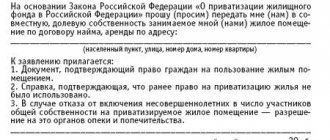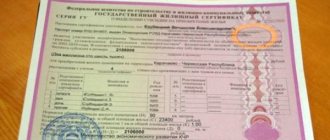Can the owner of an apartment ask a citizen who is not registered in it to vacate the premises? Through the court - easily! What if this citizen is the mother of minor children living with her? As judicial practice shows, there is no clear answer to this difficult question even in the judicial community. However, with its recent ruling, the Judicial Collegium for Civil Cases of the Supreme Court of the Russian Federation was able to dot many i’s in this topical matter for many women who are raising their children without a father and who are in a difficult financial situation.
The Supreme Court clarified that a mother has the right to live in someone else’s apartment until her children reach the age of majority, if she was previously moved into this living space legally. Thus, today in judicial practice there is an explanation from the highest court about the procedure for resolving common conflict situations, as a result of which women with children are forced to live in the only housing that does not belong to them.
The panel of judges made a landmark decision after studying the arguments of the cassation appeal of the mother of three children, who actually ended up on the street with them, and familiarizing themselves with the case materials. As a result, all judicial acts of lower courts were canceled.
Background of the issue
Several people who were related to each other lived in the municipal apartment. The responsible tenant lived there with his wife and three children. Everyone was registered except his wife and youngest child. However, she was introduced legally, with the consent of her husband’s relatives. After his death, the relatives registered in the apartment filed a lawsuit with the district court to evict the widow and children, since she does not have the right to use the living space, and in addition, she and her youngest child are not registered in the apartment.
At the court hearing, the defendant filed counterclaims to determine the period of residence in the disputed apartment until her youngest child reaches the age of majority, as well as to recognize her right to use the living space. In support of her claims, the woman pointed to the fact that her two children are registered in the dwelling in question, and she has been living in the apartment for more than seven years, during which she conscientiously bears the burden of its maintenance - pays taxes and utility bills. She presented the written consent of her relatives for her to move into the apartment, drawn up after the registration of her marriage with the responsible tenant.
Important information for you: My husband beat me or is beating me. Where to go and how to punish for beatings. What to do if your spouse beat you. How to properly remove a beating.
The court of first instance, and subsequently the court of appeal, rejected the counterclaim of the mother of three children, but satisfied the claims of the relatives of her deceased husband. The courts' conclusions are based on the fact that the defendant has her own apartment, the area of which exceeds the area of the room she currently occupies in the disputed apartment. Under such conditions, according to the court, the woman and her youngest child are living in the apartment illegally. Relocating the defendant and her children to another apartment does not affect her rights or the rights of her child.
Is it possible to legally remove a minor from an apartment and who can do this?
According to the laws of the Russian Federation, a minor cannot be registered or removed from it separately from his parents. His limited legal capacity is expressed in the need for constant adult supervision. A child can only be discharged from the apartment together with his guardian or one of them.
Only his legal representatives can remove a child from registration:
- mother;
- father;
- guardian;
- adoptive parent
When it comes to forced discharge through the court, it does not apply separately to the child, but to his guardian. The owner of the apartment has the right to file a claim in court. If the requirements are met, the adult is discharged, and along with him the minor.
We talked in detail about how to check out of an apartment through the court and draw up a statement of claim in this article.
The Supreme Court overturned all decisions of lower courts
The Judicial Collegium of the Supreme Court regarded the court decisions as erroneous and overturned them, pointing out to the lower courts that the provisions of the UN Convention, the Constitution of the Russian Federation and the family legislation of the Russian Federation were ignored in terms of respecting the interests of the child.
According to the Supreme Court, the courts of first and second instance did not take into account the requirement of the UN Convention and the Constitution of the Russian Federation on the inadmissibility of separation of children from their parents, as well as the need for actions exclusively in the interests of the child on the part of all private and public institutions. As an exception, the court may separate a child from his parents if, based on unconditional evidence, he concludes that the child will be worse off if he lives together.
According to Article 20 of the Civil Code of the Russian Federation, the place of residence of a child under 14 years of age is the place of residence of his parents. The Family Code of the Russian Federation establishes the obligation of parents to bear responsibility for their children and for their upbringing. At the same time, the state protects the child’s right to live and be raised in a family.
All of the above legal aspects were not taken into account by the courts and were not reflected in the decisions of the courts. Also, the lower courts did not give a legal assessment of the written evidence available in the case materials, namely: the certificate of unsuitability for living in the apartment owned by the defendant, the court decision that entered into legal force recognizing the right to use the disputed living space for the widow’s two eldest children , the absence of other housing for these children, the fact that the defendant lived in the apartment immediately after registering the marriage, and her payment of taxes and utility bills. Moreover, during the trial of the case in the district court, the widow presented documents on the alienation of the apartment she owned to a third party in order to collect the debts of the deceased spouse under a writ of execution.
Procedure
To remove a child from registration, legal representatives are required to perform a number of mandatory actions:
- Obtain permission from the guardianship and trusteeship authorities. The clause is valid only in cases where the child has the right of ownership in the living space from which he is being discharged.
- Collect a package of documents for yourself and your child.
- Fill out the application form and departure form.
- Submit all documents to the passport office. The presence of a minor is mandatory only if he has already reached 14 years of age. Children under this age may not come to the registration office.
After submitting your documents, you will have to wait for them to be processed. Registration authorities are given 7 days to complete this procedure.
After a week, you must come back to the passport office to register at your new address.
Opinion
Nechaev Vasily Ivanovich
Deputy Chairman of the Supreme Court for Civil Cases
In the interests of the child
In this case, one of the legally significant and subject to proof, taking into account the applicable rules of substantive law, was to clarify the question of how the court decision would most fully meet the interests of the child. It is based on the interests of the child that the court must resolve the dispute.
Momotov Viktor Viktorovich
Secretary of the Plenum of the Supreme Court of the Russian Federation
Take all circumstances into account
The court did not take into account that when considering a case, it is obliged to examine on the merits all factual circumstances and does not have the right to limit itself to establishing formal conditions for the application of the norm, otherwise it would lead to the fact that the right to judicial protection, enshrined in Part 1 of Art. 46 of the Constitution of the Russian Federation, would be significantly disadvantaged
Klikushin Alexander Anatolievich
Chairman of the Family Court of the Supreme Court
Don't separate from parents
As stated in paragraph 1 of Art.
9 of the Convention on the Rights of the Child, States shall ensure that a child is not separated from his or her parents against their wishes, unless the competent authorities, by judicial decision, determine, in accordance with applicable law and procedure, that such separation is necessary in the best interests of the child. The defendant has low-income status; the room in the disputed apartment is her and her children’s permanent and only place of residence. The youngest child is not yet 3 years old, and she is on leave to care for him. Older children cannot live alone because of their age. After the death of her husband, she was left virtually alone, to whom the legislation placed full responsibility for the life and health of her children.
The Supreme Court indicated that in such circumstances, first of all, the issue of preserving the right to use a room in the disputed apartment for the mother of three young children until she fulfills her responsibilities for raising the children must be resolved.
Calculation of alimony
Documentation
When contacting the passport office to deregister a minor, you will need to collect and provide the following package of documents:
- Passports of parents or guardians.
- Child's birth certificate.
- Application for discharge.
- Departure sheet.
If the extract is related to the sale of an apartment, then documents are submitted for the space being sold and for the space being purchased. Depending on the situation, other forms may be required.
Guardianship permission
Written permission to be discharged from the guardianship authorities is only needed if the child is the owner of the home. In this situation, representatives of the guardianship and trusteeship authorities act as a third party ensuring compliance with the rights of the minor.
To obtain permission you will need to provide documents:
- For the living space being sold, indicating the size of the child’s share.
- For the apartment being purchased.
- Preliminary purchase and sale agreement.
- Estimated value of both apartments.
- Birth certificate.
- Guardians' passports.
If no other housing is purchased, then a statement of intentions is written to transfer the entire cost of his share to the child’s account.
Consent of the legal representative
- An application for discharge is submitted on behalf of one of the parents. The second must be present at the passport office and confirm his consent to the action being taken.
- If both representatives are registered with the child at the same address, then written consent is not required.
- If the child will live with only one of the parents, then the written consent of the second is required for his registration at the specified address.
Mortgage: children-owners
The main feature of registering a mortgage on an apartment partially owned by a child is the conflict of interests of the bank and the guardianship authorities.
Without the permission of the municipalities, it will not be possible to make the apartment the subject of collateral. From the point of view of the board of trustees, encumbering real estate with collateral is a significant deterioration in living conditions. Even if the mortgage involves a significant increase in the child’s share, the guardianship authorities consider the risk that is in any case present when lending. So, circumstances may change, and if the parents/guarantors/co-borrowers are unable to pay interest on the mortgage, the bank will have the right to sell the apartment at book value. In this case, a minor child may be left homeless.
Not all children are owners because, by law, parents' property does not belong to their children.
Like an adult, a child can
obtain ownership of an apartment as a result of its privatization
(if he actually lives or is registered in it at that moment), purchase, gift or inheritance.
When and how can I appeal?
The court decision can be appealed by filing an appeal within a month (Article 321 of the Code of Civil Procedure of the Russian Federation). Procedure in such a situation:
- File a complaint and pay the state fee.
- Deliver the document to the court of first instance.
- Wait for a response, which may take up to two months from the court.
- Receive an appellate determination and act within the framework of the verdict.
The grounds for changing the court verdict on appeal are as follows::
- incorrect definition of circumstances significant to the case;
- the lack of confirmation of such circumstances by the court of first instance;
- discrepancy between the court's conclusion and the circumstances of the case;
- violation or incorrect application of the law (the necessary law was not applied or vice versa).
What can you do
The collection of mortgage debt by a bank by imposing a debt on the mortgaged property can be counteracted within the framework of the law. To do this, a counterclaim is filed, which indicates the invalidity of the contract, incorrect execution or its absence. All existing violations should be presented to the court: the spouse’s disagreement with the terms of the loan agreement with the alienation of collateral housing, non-coordination of transactions with the property of a minor with the guardianship authorities. You can refer to the impossibility of alienating the apartment due to the lack of rights. Alternatively, there must be two mortgage agreements: for the building and the land on which it is located.
Therefore, to the question of who cannot be evicted from an apartment with a mortgage, there is a clear answer - any citizen with children who has a mortgage debt for 6 months is subject to eviction. In order to make mortgage lending feasible for a certain category of citizens, the Government of the Russian Federation developed a target program “Housing”, which reflected projects for mortgage protection of military personnel and young families.
It should be remembered that a decrease in family income due to the birth of another baby will not in any way affect the decision to seize the collateral due to late payment.
Methods for discharging a minor
There are 2 main ways to remove children from an apartment:
- Minor children can be evicted to an apartment owned by a relative or guardian. Most often this is what happens, because a person will not simply be thrown out onto the street. Especially if it is a minor.
- If there is no such living space, then a place is found for the children in the structure of the guardianship authorities. This is an orphanage, boarding school or other government institution. Such situations usually happen when parents are deprived of parental rights and the premises are taken away.
There are situations when the bank turns to court to take away the mortgaged apartment due to debt on the loan.
Then the bank usually buys new premises for the debtors at a cheaper price, and the difference in price goes towards paying off the debt . Then the child is registered in a new living space.
If parents plan to evict a child (for example, in order to sell their home), then they should immediately take care of the living space for his new registration. If you delay, there will be problems with the law.
Useful video
Watch a video on the topic:
Certain difficulties may arise not only during the removal of children from residential premises, but also during the eviction of adult citizens. We discuss the nuances of carrying out such a procedure in various situations in the following publications:
- How can you evict a person from an apartment without a trial if he is not registered in it?
- Rules for eviction of a registered person from an apartment if he is not the owner.
- When is it possible to evict without providing alternative housing?
- Is it possible to evict a person from his only home?
- How does eviction for non-payment of utilities from a municipal apartment proceed?
- How can you evict tenants from a communal apartment?
- Step-by-step procedure for eviction of illegally residing persons from an apartment.
Eviction algorithm
To evict mortgage debtors, pre-trial work is carried out with the defaulter. The lender notifies the borrower in advance of non-compliance with the obligations of the mortgage agreement and the natural subsequent eviction.
If the bank sends a claim to the court without prior notification to the borrower, or the amount of non-payment is less than 5% of the collateral, the court may refuse to initiate proceedings against the defendant.
The creditor submits to the court the grounds for eviction, he must prove that the borrower was provided with conditions for repayment of non-payments, but the funds were never sent to the bank by the defaulter.
The court then makes a decision on eviction. District courts at the place of residence of the defendant hear eviction cases.
In what situations is it prohibited?
Next, we will consider several cases when eviction of a child is prohibited or impossible:
- Orphans, children without formalized guardianship, and dependents cannot be discharged under any circumstances. The law simply does not provide such opportunities. If the child is not just a relative of the apartment owner, but also his dependent, then it is impossible to discharge him.
- It is also impossible to carry out the procedure if the owner of the property is neither a relative of the child nor his guardian.
Attention! Strangers cannot initiate the eviction of a minor under any circumstances. - A child usually cannot be evicted if both parents remain registered in that living space. The exception is cases when spouses are deprived of parental rights, and their offspring is assigned to an orphanage or a family of guardians.
About the opportunity
Yes, it is possible, both at the request of their parents and through judicial procedure .
Housing legislation does not prohibit the eviction of minors.
This is especially true for private privatized apartments, where the owner’s desire is enough for everyone else to leave the premises.
The situation is different with a municipal apartment. Only one thing is possible here - voluntary discharge of the child by the mother. In this sense, the board of trustees completely trusts her. It is impossible to forcibly remove a child from a non-privatized home, even through the courts.
Read about the grounds and procedure for eviction in our article.
Reasons
Most often, the following circumstances become grounds for eviction of a minor:
- The owner of the residential premises intends to sell it.
- The parents' temporary registration has expired, and the owner does not intend to renew it.
- The parents of the minor are registered at a different address.
- The child has ceased to be a member of the apartment owner's family.
As stated above, a child cannot be evicted anywhere; according to the Civil Code of the Russian Federation, a child is moved to a residential premises where his father or mother is registered for a given period of time.







